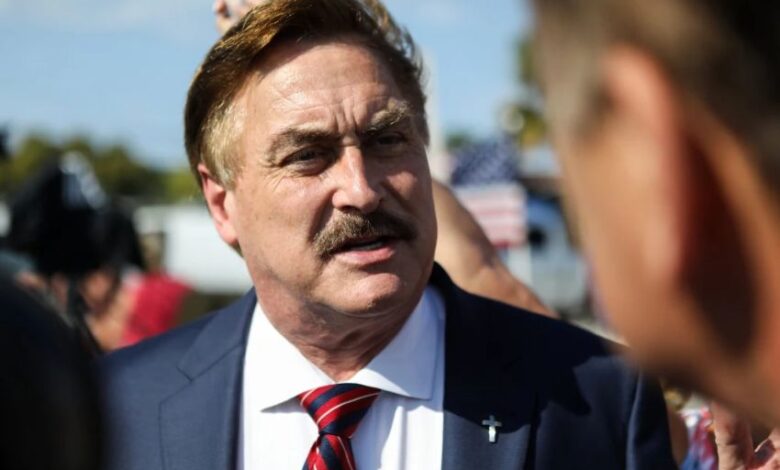
Mike Lindell, better known to millions as the face behind MyPillow, is one of America’s most talked-about entrepreneurs. His story is not your average business biography—it’s a mix of rags-to-riches success, deep personal transformation, polarizing politics, and dramatic financial swings. From battling drug addiction to building a multimillion-dollar company from scratch, Lindell’s life has been nothing short of a rollercoaster. His journey is a testament to both the power of redemption and the volatility of fame in today’s interconnected world.
In recent years, Lindell has remained in the public spotlight not only for his business achievements but also for his outspoken political opinions, which have significantly impacted his financial status. While he once stood among the most successful self-made businessmen in the U.S., his wealth has since faced major declines due to legal issues and lost business opportunities. This article takes a deep dive into Mike Lindell Net Worth—how he earned it, the controversies that jeopardized it, and where he stands today financially.
Early Life and Background
Mike Lindell’s life began in Mankato, Minnesota, on June 28, 1961. He grew up in a humble environment, moving to the suburb of Chaska during his childhood. From an early age, Lindell exhibited signs of a troubled youth, struggling to stay focused in school and often clashing with authority. He eventually enrolled at the University of Minnesota, but he dropped out shortly after starting, unable to find direction. It was during this time that Lindell began his descent into substance abuse, a problem that would plague him for decades.
His struggles with addiction weren’t limited to alcohol—they expanded into a full-blown crack cocaine dependency that derailed his early adult years. Lindell has publicly admitted to heavy drug use during the 1980s and 1990s, leading to arrests and failed businesses. He started multiple ventures, including carpet cleaning and lunch wagon businesses, but nothing seemed to stick. However, these failures taught him resilience. Despite hitting rock bottom several times, Lindell never gave up on his entrepreneurial ambitions. His lowest moments would eventually serve as the foundation for one of the most unexpected comeback stories in modern business.
The Rise of MyPillow
The idea for MyPillow came to Lindell in a dream—or so he claims. Tired of sleepless nights and unsatisfied with traditional pillows, he began experimenting with different types of foam and designs. In 2004, he officially launched MyPillow from his basement, investing his last remaining funds into the project. He initially struggled to get retail stores to carry the product, but he persisted by selling at trade shows, mall kiosks, and state fairs. His charismatic personality and genuine enthusiasm began to resonate with customers.
Lindell’s big break came in 2011 when he produced a 30-minute infomercial for MyPillow, spending a staggering $500,000 to get it on air. The risk paid off—the infomercial was a hit, generating over $5 million in sales in just one month. The success continued to snowball, and Lindell rapidly expanded the company. MyPillow became known for its “Made in the USA” label and its patented fill, which claimed to provide better sleep support. By 2017, MyPillow had sold over 30 million units and employed more than 1,500 people. The company’s growth was nothing short of phenomenal, making Lindell a household name and cementing his status as a successful self-made millionaire.
Peak Net Worth
At the height of his success, Mike Lindell’s net worth was estimated to be between $200 million and $300 million. This immense wealth was largely generated through the explosive sales of MyPillow products, which were promoted through aggressive advertising and endorsed by numerous public figures. The company was pulling in more than $100 million in annual revenue at its peak, with Lindell claiming to spend tens of millions per year just on television advertising to maintain visibility and demand.
Lindell’s fortune allowed him to expand his empire, not just through product lines like mattress toppers, sheets, and towels, but also by branching out into personal projects. He invested in self-publishing his memoir, developing a faith-based recovery network, and even starting his own media platform. For a time, his wealth gave him the freedom to champion causes he believed in without worrying about financial consequences. However, this golden era didn’t last long. As his personal beliefs began to clash with mainstream retailers and media outlets, the financial fallout would soon follow, putting a major dent in his once-impressive net worth.
Political Involvement and Controversies
Mike Lindell’s political involvement exploded onto the national scene during the Trump presidency. An outspoken supporter of Donald Trump, Lindell quickly became one of the most visible faces among the former president’s inner circle of business allies. He frequently appeared on conservative news networks and even at official events, promoting Trump’s message and aligning himself with his administration. But it wasn’t just his support of Trump that stirred controversy—it was his adamant promotion of claims that the 2020 U.S. presidential election had been stolen.
These unfounded claims became central to Lindell’s public identity and soon began to take a toll on his business. Major retailers like Bed Bath & Beyond, Kohl’s, and Wayfair dropped MyPillow from their shelves, citing customer complaints and backlash over Lindell’s political views. He responded by doubling down, investing millions of his own money to produce documentaries, fund rallies, and launch FrankSpeech—a social media platform aimed at providing a voice for conservative Americans. These actions earned him praise from some, but heavy criticism and legal trouble from others.
Most notably, voting machine companies Dominion and Smartmatic filed massive defamation lawsuits against Lindell, each seeking over $1 billion in damages. These legal challenges not only threatened his personal fortune but also cast a long shadow over his business ventures. For many observers, Lindell’s political outspokenness represented a sharp departure from the more neutral stance typically adopted by business leaders. The consequences were swift and severe, reshaping public perception and pushing his finances into a downward spiral.
Legal Challenges and Financial Decline
Over the past few years, Mike Lindell’s financial empire has faced intense pressure due to a combination of legal troubles and corporate fallout. One of the most significant blows came from a series of defamation lawsuits filed against him by companies such as Dominion Voting Systems and Smartmatic. These companies accused Lindell of spreading false claims about the 2020 U.S. presidential election, resulting in billion-dollar lawsuits that still loom over his financial future. Defending himself against these lawsuits has cost him millions in legal fees, further straining his finances and business operations.
In addition to the lawsuits, MyPillow suffered substantial commercial losses. Several major retailers, including Bed Bath & Beyond, Kohl’s, and Wayfair, cut ties with MyPillow following Lindell’s controversial political statements. This loss of distribution channels had a direct impact on sales and brand visibility. Lindell admitted publicly that his company lost around $100 million in retail revenue alone due to these severed ties. Moreover, he has reported taking out personal loans to keep MyPillow afloat, which has contributed to the significant dip in his net worth. What was once a booming business empire began to show signs of financial instability.
Current Net Worth
As of 2024, Mike Lindell’s net worth is estimated to be significantly less than during his peak. According to multiple sources, his current net worth ranges between $10 million to $30 million—a stark contrast to the $200–$300 million estimated in previous years. This sharp decline underscores the financial toll of ongoing legal battles, dwindling MyPillow revenues, and the cost of maintaining his media presence and personal legal defense efforts.
While this figure may still seem substantial, it represents a massive reduction in wealth for someone who once ranked among the richest entrepreneurs in the U.S. retail space. Lindell himself has acknowledged that he is “all in,” having poured personal savings and borrowed capital into defending his name and company. He’s also spent millions funding his own social media platform, “FrankSpeech,” and organizing events around election fraud narratives, which, while aligning with his beliefs, have offered little financial return. Lindell’s case is a dramatic example of how public controversies and political involvement can drastically alter one’s financial status.
Personal Life
Mike Lindell’s personal life has been just as turbulent and dramatic as his business ventures. He has been open about his struggles with addiction, particularly to cocaine, crack, and alcohol, which plagued much of his early adult life. At one point, his addiction was so severe that friends staged interventions and suppliers refused to sell him more drugs out of fear for his life. In 2009, Lindell turned his life around, crediting his recovery to his faith in God, and eventually founded the Lindell Recovery Network, a nonprofit organization aimed at helping addicts find hope and rehabilitation.
In terms of family, Lindell has been married twice. His first marriage ended in divorce, and his second, to Dallas Yocum, was notably brief—lasting only a few weeks before ending in separation. Despite the challenges, Lindell remains close to his children and has often cited them as sources of motivation and strength. His journey from addiction to millionaire status is frequently used by him as a testimony of personal transformation and redemption, underscoring his deep religious beliefs and how they shape his worldview.
Philanthropy and Social Initiatives
Beyond business and politics, Lindell has made significant efforts in philanthropy, especially in areas that align with his personal experiences. One of his major initiatives is the Lindell Recovery Network, which focuses on helping individuals overcome addiction. The platform connects users with Christian-based recovery organizations and resources, reflecting Lindell’s belief that faith played a pivotal role in his own recovery. His dedication to addiction recovery goes beyond financial contributions—he frequently speaks at recovery events and shares his personal story to inspire others.
Lindell also claims to donate MyPillow products to disaster relief efforts, veterans’ organizations, and shelters. While the scale of these donations isn’t always publicly disclosed, he has positioned himself as a businessman with a mission, integrating charitable outreach into his brand identity. However, some critics argue that his philanthropic work is often overshadowed by his political activism and controversial statements. Still, for many of his supporters, Lindell represents a unique blend of capitalism and Christian charity, using his platform to champion causes close to his heart.
Business Ventures Beyond MyPillow
While MyPillow remains his flagship brand, Mike Lindell has ventured into other businesses and projects, some with limited success. One of his most talked-about ventures in recent years has been “FrankSpeech,” a social media platform he launched in response to what he claims is censorship on mainstream tech platforms. FrankSpeech was designed as a space for conservative voices, but it has struggled to gain traction and financial viability, despite the substantial investment Lindell has made into promoting and running it.
Another one of Lindell’s business attempts included the creation of books and documentaries pushing his political beliefs. His autobiography, What Are the Odds? From Crack Addict to CEO, was self-published and distributed primarily through his business networks. The book details his rise from addiction to success and is often bundled with MyPillow orders as part of promotional campaigns. Though these ventures have helped keep Lindell in the public eye, their financial return has not been comparable to the revenue generated by MyPillow in its heyday. As a result, while Lindell remains active in multiple business spheres, none have reached the profitability or recognition of his original pillow empire.
Media Presence and Public Perception
Mike Lindell’s media presence is impossible to ignore. For years, he was a staple on late-night television through MyPillow infomercials, easily recognizable with his mustache and enthusiastic pitch. These commercials played a huge role in building brand recognition and transforming him into a sort of cult figure in the infomercial world. However, his transition from the pillow guy to a politically polarizing figure dramatically shifted public perception. What started as admiration for a self-made entrepreneur slowly turned into criticism and ridicule from various corners of society.
After aligning himself closely with former President Donald Trump and pushing unfounded claims about the 2020 election, Lindell’s public image took a significant hit. Major news networks began covering him not for his business acumen, but for his role in spreading misinformation. Late-night hosts, internet commentators, and media personalities often used him as a subject of satire, further complicating his public persona. While he retains a loyal base of supporters who admire his outspokenness and conviction, others view him as a cautionary tale of how politics can derail a successful business brand.
Lessons from Lindell’s Journey
Mike Lindell’s story is filled with lessons—some inspirational, others cautionary. On one hand, his rise from addiction and homelessness to multi-millionaire status is a true rags-to-riches tale. His belief in a product, tireless work ethic, and refusal to give up even during the toughest times make for an inspiring entrepreneurial narrative. His story reminds us that it’s possible to overcome personal demons and build something meaningful, even if the odds are stacked against you.
On the flip side, his journey also serves as a warning about the intersection of business and politics. Lindell’s deep involvement in controversial political matters led to boycotts, lawsuits, and a massive loss in revenue. His refusal to separate personal beliefs from his professional life has cost him partnerships, public goodwill, and significant wealth. For entrepreneurs watching from the sidelines, Lindell’s story reinforces the importance of brand perception, understanding your audience, and being mindful of how public actions can influence private outcomes.
Future Prospects
Despite the controversies and financial setbacks, Mike Lindell shows no signs of stepping away from the spotlight. He continues to push his narrative and remains committed to both his business and political endeavors. Whether it’s launching new MyPillow products, promoting his social media platform FrankSpeech, or organizing events, Lindell seems determined to remain relevant. The question now is whether he can make a financial comeback or if his current path will lead to further decline.
There’s potential for recovery, especially if Lindell can successfully pivot his brand and rebuild relationships with retailers or attract new audiences. However, it won’t be easy. Legal battles still loom large, and public perception remains divided. If he can manage to separate his business operations from political controversy, focus on innovation, and rebuild customer trust, there might still be room for a turnaround. But if he continues to double down on polarizing views, the financial and reputational damage may prove irreversible.
Conclusion
Mike Lindell’s journey from a struggling addict to a wealthy entrepreneur is undeniably remarkable. However, it’s also a complex story filled with dramatic twists—success, controversy, legal woes, and financial downfall. His rise to fame through MyPillow demonstrated the power of resilience and belief in one’s product. Yet, his entanglement in political movements and misinformation campaigns led to serious personal and professional consequences. Today, he stands as both a symbol of redemption and a warning of how quickly fortunes can change when business mixes with divisive ideologies.
Ultimately, whether one admires Lindell or criticizes him, his story is a fascinating case study of modern fame, entrepreneurship, and the volatile nature of public opinion. What comes next for him remains uncertain—but if his past tells us anything, it’s that he won’t go down without a fight.
FAQs About Mike Lindell Net Worth
What was Mike Lindell’s peak net worth?
At his peak, Mike Lindell’s net worth was estimated to be between $200 million and $300 million, largely driven by the success of MyPillow.
What is Mike Lindell’s net worth in 2024?
As of the latest estimates, Lindell’s net worth has declined significantly to somewhere between $10 million and $30 million, due to legal issues and business setbacks.
How did Mike Lindell lose money?
Lindell faced major financial losses due to lawsuits, loss of major retail partnerships, and significant spending on political and media ventures like FrankSpeech.
Is MyPillow still in business?
Yes, MyPillow is still in operation, although it has lost many of its retail partners and now relies heavily on direct-to-consumer sales.
What other businesses does Mike Lindell own?
Aside from MyPillow, Lindell launched FrankSpeech, a conservative social media platform, and authored a memoir titled What Are the Odds? However, these ventures have not matched MyPillow’s earlier financial success.



